#ALSO I know that Greek and Roman is not the same and there are people who will be mad that I conflate the two
Note
Hey out of curiosity, I know most of the main cast in CTB is pulled from either Legend of Zelda game canons (Princess Zelda, Lana, Ganondorf in name, etc) or Linked Universe, but out of your original characters (especially Kat, Marigold, and the various Knights of Hyrule), did u give any of them symbolic or referential names?
Oh boy do I got the fun post for you:
Lincoln is straight up my Linksona. Just think of him as another version of the character Link
Marigold is supposed to be the typical red-headed love interest for a Link-like character; even her name is meant to fit right in with characters like Malon, Marin, and Midna.
Warriors's last name was originally going to be Warton, but I changed it to Walton when I learned that it meant "noble."
Meemaw is a reference to the Bertolt Brecht character Mother Courage (from his play Mother Courage and Her Children; I had just finished reading it for a seminar class when CTB first came to me). The characters even share a first name: Anna
Similarly, Kat is based off of Mother Courage's daughter, Kattrin; a famously silent-due-to-truama character
Kat's siblings also share names and fates with Mother Courage's sons: Eli is Eilif, and Cheddar is Swiss Cheese (yes, that's his real name)
Orlanda was named for Virginia Woolf's famous character Orlando; originally, I was going to have Orlanda be nonbinary, but changed my mind when I realized it wouldn't be a good idea to make your sacrificial character your nonbinary representation.
Shigeo's name was originally just going to be Shig, as a reference to Shigeru Miyamoto, but I changed it when I started to rewatch Mob Psycho 100. Shigeo is meant to be a homage to a common original character type I kept reading in Warriors-centric fics: the young Sheikah guy for Warriors to have a romance with. However, Shigeo was never envisioned with a romantic relationship in mind. He was always meant to be this cool, older guy type. However, I did almost have Warriors have a crush on him, then deleted that concept for space.
Gaudin was named after a French criminal for no reason. Genuinely, I just liked the name.
Anders was originally going to be named Betolt in honor of Brecht, but that felt heavy handed.
Jakucho is just meant to be the old woman version of the general Impa character to match the badass young woman version that is actually in Hyrule Warriors. Her name means "silent, lonely listening." I liked how it related to her role as Warriors's mentor/therapist.
Impa's real name, Chiyo, means "thousand generations, thousand worlds." I like how it related to the idea that she's always wanted to assume the same role as her ancestors.
I originally picked their surname Miyashita because the site I was on said it translated to something like "temple below the earth," which would reference the Kakariko Well. Checking now, it actually means "(one who lives) below the shrine," which makes way more sense in retrospect.
Ayane has no special name meaning, but her character... you do realize she's just Mask, right?
General Whitestone's name came from me asking myself what would a highly suspicious white guy in charge be called?
The name Nephus translates to "a God's son who will also become a God." Do I mean that literally? Who knows. At the very least, I wanted a snappy, but impressive-sounding name.
Vasileios means "royal or kingly". His middle name, Orionides, implies that he's the son of a great hunter.
Icarius's name is meant to be reminiscent to that of Icaurs, the famous mythological figure.
Philo means "lover or friend." A very cute name for a not-so-cute boy.
You probably have realized that the House of Nephus characters are heavily Greek/Roman coded. Originally, they were going to be Russian coded, but then the line about Faovaria being unable to attack some other kingdom due to their harsh winters would have fallen into question.
Faovaria's symbol being an octopus is a reference to how the octopuses symbolized immortality in ancient Greece.
Both of those were super off-topic. Sorry lol
I'll end with a fun fact you shouldn't look too deep into: the empire name Faovaria is derived from Farore. This was due to a concept I changed my mind about. Genuinely, it's not relevant anymore. Do not incorporate it into your theories, or something.
#i don't make it my policy to give every character special name meanings so if i didn't bring someone up...#...it's probably because I just liked that name to begin with#but fun fact I was looking at one of my old fanfics and i also used the name Marigold for a throwaway character and it gave me whiplash#me rambling#lu ctb#ask#linked universe#shoot-i-messed-up#ctb lore#ALSO the reason why Faovarians in general were going to be russian coded is SO STUPID that I don't even want to mention it. like it's super#embarrassing and I'm a little ashamed that I almost did a whole plot point about it#ALSO I know that Greek and Roman is not the same and there are people who will be mad that I conflate the two#but consider this: I do not care
32 notes
·
View notes
Note
Now I'm wondering how countries like Japan and China teach literacy.
Since kanji / hanzi don't really have that much in the way of phonetic elements, they kinda have to teach them by memorization and I don't think they have many reading comprehension problems over there.
(Although both countries do have supplementary phonetic writing systems in the form of bopomofo and pinyin for China, and the kanas for Japan)
--
FAVORITE SOAPBOX TOPIC UNLOCKED!
RELEASE THE KRAKEN!
It's a little closer to teaching vocabulary than spelling, but the same kinds of principles apply: You teach the building blocks, like the traditional radicals, which aren't so different from teaching Latin and Greek roots in an English class for English speakers.
And, as a matter of fact, lots of those radicals do predict pronunciation, just not in every single case. They can also be clues to meaning, but again, not absolutely consistently. Many characters have a sound-cueing radical on one side and a meaning-cueing radical on the other. It's just that only some are still useful in the modern day, while others are more like the English word 'plumbing' where knowledge of Roman lead pipes explains why this word comes from the one for lead, but the root probably wouldn't help a kid learn the word in the first place.
One similarity to teaching phonics would be teaching students to tell very complicated and similar characters apart: you want to help a student spot all the little building blocks of the character and then spot the ones that are different, not just glance at the whole character and get a general overall vibe. If you do a whole look-based approach, too many characters are too easy to mistake for one another.
Remembering a bajillion Chinese characters is hard if you're trying to memorize them in a year and not all of elementary school, but I think people who don't read them underestimate how many component parts there are and how approachable they can be if you start by learning fundamentals, not just memorizing a few individual characters as though they have no relation to anything else.
They're actually pretty systematic, just in the way that English spelling is with its overlapping systems and historical artifacts, not in the way that highly regular Spanish spelling is.
Having taken a lot of Japanese classes, I will say that Japanese as a foreign language textbooks often do a piss poor job of this and totally do teach kanji in a sight words-y way... But my Mandarin class started with important foundational concepts that served me well in Japanese later even if I bombed out of Chinese class at the time.
Can you tell how irritated I am by all the foreign language learners who think characters are sooooo hard when, really, it's just their crappy textbook? Haha.
They're moderately hard in the way that learning a full adult spectrum of vocabulary is hard, but people do that for foreign languages all the time. The countries that use characters do tend to make sets that are smaller for certain kinds of applications, same as we have things like simple English wikipedia, but a literate adult will always know lots more, whether it's from their career in engineering or their predilection for historical romance novels.
Uh... anyway, the answer is "Bit by bit in elementary school, just like in any other country".
653 notes
·
View notes
Note
hi, I understand if you’re too busy with life and writing other stuff (or if you just don’t want to write this), but I would like to request a fic or hc that I have had in my mind for a long time. I have honestly just been waiting to find the right person to ask for this, I love your stuff so much, but back to the request. Can you write a daughter of Neptune meeting Percy for the first time (I would like to imagine she’s younger than him and he immediately becomes an overprotective brother), and ether is dating Jason or starts dating Leo. Sorry for making this so long just to ask a question. Thank you.
⋆ ˚。⋆౨ৎ˚ Greek or Roman, You’re Still Family
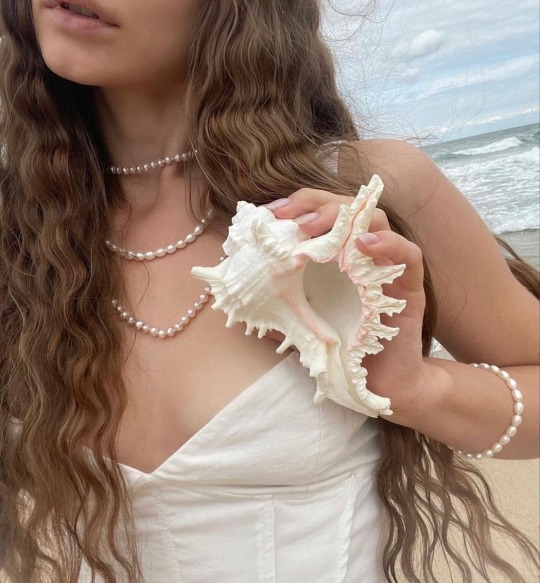


content: platonic! percy jackson x daughter of neptune! reader (jason grace x reader but not the main focus) fic
warning: not canon at all, like not even close,
author's note: this was such a cute concept and you were so polite in your ask that i decided to make it a whole ass fic. look where kindness gets you, folks. also, i had more plans for this but it was getting to be too large so i might do some small spin off hcs but i've got to work through the stuff i have now before that. when i open my requests again, if that's something you want, just hit me up fr.
y/n had gotten used to being alone. nearly everyone else at camp jupiter had siblings or at least people who felt like siblings. and it's not like the girl didn't try to build these connections. she was always met with frightened looks or blatant disrespect. at least, for a while, she had jason grace. the sweet son of jupiter who connected with the lovely daughter of neptune quickly. they both had that longing desire for more, like they had that sibling love to give to someone but no one to give it to. they found solace in each other and eventually love. but then jason disappeared. just up and left, not a word or even a note left in his absence. she begged reyna to let her keep looking but the daugther of war turned her down instantly, claims of the safety of the camp and other bullshit that y/n didn't believe in.
then, y/n started having strange dreams. well, stranger than normal. dreams of a boy who looked like her and felt like the sea - felt like home. dreams of a boy that seemed to be sleeping and too far out of y/n's reach, until one night he was within reach. the girl stretched in her dream, her fingertips just brushing his hand, causing the boy to shoot up instantly and look over at her. she went to open her mouth but was waking up in her room before she could get anything out, ripping off her sheets and setting her feet against the cold tiles in attempt to calm her racing heart.
and then, it got even weirder, as y/n saw the same boy walking around new rome the next day. she halted her steps, looking at the boy clad in neon orange before taking rapid steps towards him, grasping his arm. he turn to her, going to tug his arm free but freezing as he saw her face.
"it's you."
they both spoke at the same time, staring at the other, feeling like they were looking in a mirror. then, appearing above the boys head, a spinning blue and green trident. she knew that image well, it was the same one that appeared above her head all those years ago.
but neither of them needed a sign from their father that they were family. they knew. and percy, in desperate need for some comfort within his muddy and meddled with mind, pulled her into his arms instantly. the girl squeezed him back just as desperately, knowing her love for a sibling wasn't displaced, just lying in wait.
within the short time percy was at camp jupiter, he became overbearingly protective of the girl. during an extremely candid night in their bunks, the girl revealing her loneliness in the roman camp and the ostracization she felt as one of the few children of the big three. she also talked about jason, just happening to leave out the fact that he was her boyfriend. she didn't need percy getting stressed out about that, seeing as he was already seething at the thought of his little sister struggling alone. so she altered the truth, painting jason as simply a ‘good friend.’ in all honesty, it killed her to lie about him to her brother, but she figured it was for the best.
once percy came back from his quest and helped save the camp, they caught news that a greek airship was approaching camp jupiter, apparently in peace and with important cargo, whatever that meant. y/n basically clung to percy's side while they waited for the greeks to come down, chewing on her lip in worry.
"i'm sure they'll be cool. hopefully people i know," percy told her, patting the top of her head in hopes of comforting her.
"maybe it's the girl, the blonde smart one," y/n replied, offering him a hopeful smile. percy didn't respond, though a smile stretched over his lips at the thought.
then the greeks finally came down. a boy with crazy curly hair, a girl with fun eyes and a feather in her braid. then another girl, this one blonde, leading y/n to look up at percy, expectantly and with baited breath. which led to her completely missing the last 'greek.'
percy and the blonde girl saw each other and y/n could tell this was percy's girlfriend. it had to be, from the way his body jolted to go to her to the way she did the same. they met somewhere in the middle, months and months lost but you wouldn't know it from the way they looked at each other. they held each other tighter than y/n thought possible, a smile gracing her lips at her brother's happiness. she felt a pang in her gut though, some part of her hoping to see jason like that one day, to run to him and hold him tight and never let him go again. she hoped the fates were kind enough to grant her that wish, kind enough to give back her son of jupiter-
"y/n?" a voice, an all too familiar voice, choked out. y/n's head instantly snapped towards the sound of his voice, her chest beginning to heave and she hadn't even seen him yet. she shoved past the other roman demigods, her eyes frantically scanning the crowds, desperate to get through them. she pushed her way to the greek demigods, nearly falling as she broke through but a gust of wind pushed her back up to her feet. she looked up through her wild hair and saw her boy, her son of jupiter, her jason grace.
"oh, jason," she whimpered before sprinting the small distance between them, jason colliding into her as well, his arms secure around her waist as he lifted her off the ground and held her close to his chest.
"you're- you're here?" the girl cried into his shoulder, jason holding her as tight as he could.
"i'm here. i'm right here, sweet girl. i've got you back," jason whispered back, his eyes squeezed shut in fear he'd open them and find himself back in his bed on the argo ii, all of it just a dream. but he felt her hands clawing at his back and his arms, clinging to him like a starfish, and he knew this was real.
"i- i was so worried, jase. you were just gone and...and i was so sure you...i," the girl attempted to talk but her throat was dry with the heaving breaths she was taking in and her mind was going blank the only thought in there being jason, jason, jason.
"i know. i'm sorry. i'm so sorry," jason cut in, saving her from taking anymore, pulling back to look into her eyes that he loved so much. that he'd grown to miss, seeing the sea green color in his dreams, hidden behind dark lashes and convoluted with the sight of admiration. at time, he didn’t know who’s eyes they were. now, now he could tell you everything about the girl before him from her favorite color to how they met. and he’d never been more grateful for knowledge.
"it doesn't matter. you're home, that's what matters," y/n added, reaching a hand up and setting it against his cheek. jason instantly leaned into her touch, blow a breath out before letting instinct take over. he leaned down as she leaned up, a dance they'd perfected years ago, jason needing nothing more than muscle memory to find her lips settled against his. he'd missed this too, the velvet softness and the way he could just barely taste salt on her lips. surely a trait all children of poseidon had but jason had no intentions of finding out, kissing his ocean girl being more than enough for a lifetime.
"just your friend, huh?" percy's voice called from somewhere behind y/n, who smirked against jason's lips, raising her free hand and flipping her brother off.
percy's laugh was loud as the two roman's pulled apart, sharing soft looks and warm smiles. jason took her hand into his, feeling the girl curl into his side with a content sigh and he knew he'd be alright from this point on. i mean, he got back his girl, what more does a man need in his life?
#postcards from covey ౨ৎ#all my love ౨ৎ#pjo#pjo fandom#percy jackon and the olympians#heroes of olympus x reader#percy jackson#hoo#heroes of olympus#jason grace#jason grace x reader
479 notes
·
View notes
Note
Hi I have concept questions rate the yandere Greek gods, and who is most likely out of them with sexually assault or rape reader any gender I don’t know it came in my mind after I found out that Ares has never raped a women or man in my opinion that is a really shocking thing coming from the god of war I mean when comes to gods it’s a pretty good standard because I have read about so many sexual assaults in Greek mythology. for example obviously, Zeus is most likely going to force himself on reader he has done it many times and then the other one is Poseidon he did it with medusa if I remember correctly, so he is most likely to do it, and he has done it with other people and then Eros I don’t know why I just think he would do it and Apollo would do it and I actually thought Ares would would also sexually assault reader, but after finding out that he never did with anyone I don’t he would force himself on reader since he has never done it in Cannon fun fact, one of the sons of Poseidon raped his daughter and when Ares found out, he was furious and killed Poseidon son. Hades, this is another god I think he would not force himself on reader. But I’m not sure about Dionysus maybe he would and Hephaestus is another god who would force himself because he did it with Athena if I remember correctly. Aphrodite, maybe you would do it too. Hermes is another god I think he would do it too. What do you think can you Frank them from? Who is most likely to do it to who is least likely to do it and never do it at all.
tw: talk about rape/sexual harassment.
I would say the same ones you mentioned above.
Zeus and this one doesn't even need explanations. Poseidon, depending on the version, is said to have raped Medusa, but this is the Roman version and not the Greek, so it depends on which myth you prefer, but I think he would be able to force himself on the Reader.
Apollo would do it if he was rejected by his beloved, and he wouldn't even think he was doing anything wrong. Eros would also force himself on his darling if he was rejected in a very cruel way, then he would force them to be his.
Although there are no records of Ares forcing himself on anyone, as we are doing a headcanon and I don't work with canon but with the voices in my head, I would say that he could force himself on the Reader. And he wouldn't even need much for that, it can easily be motivated by jealousy, pure lust or just because he wants to mark the Reader as his.
Hephaestus... It's complicated, the reason he tried to abuse Athena is because of Poseidon, in a way. Poseidon became jealous of the closeness of Athena and Hephaestus and incited the god of forging to make unwanted advances on the goddess of wisdom, thinking that she liked him. He never actually raped her, it was more like harassment, but he came on her thighs and a child was born from that. Bizarre? Yes. Would he abuse his S/O? Look, it depends. I think that if Hephaestus was really consumed by obsession, by jealousy, he could force himself on his darling.
Hades would never force himself sexually on his darling. He can kidnap them (and he will), he can lock them up but he will never do anything against their will, sexually speaking. He doesn't want to be like his brothers and loathes it, so he would never touch the Reader without their consent.
Dionysus would do it too. He is delusional enough and the reason he would abuse his darling could be motivated by how delusional he is. The god would be so delusional that he wouldn't even realize that the Reader doesn't want to sleep with them.
Hermes would only do so if he wanted to dismantle power over his S/O. Like, he did that to them because he can, because they are his and that means he can take them wherever he wants and whenever he wants. A form of control and psychological torture, in a way.
I think Aphrodite would be the only one of the goddesses to abuse her darling, but for her, she would not be committing abuse but rather showing how much she loves them. And for her, the goddess of love, also the patron saint of prostitutes, what better way than to have sex with her darling? Even if it's not consensual.
#ask#yandere greek gods#yandere greek mythology#greek gods x reader#concept#yandere concept#yandere Zeus#yandere poseidon#yandere hades#yandere hermes#yandere dionysus#yandere Hephaestus#yandere Aphrodite#yandere ares#yandere apollo#yandere Eros
397 notes
·
View notes
Text

So I got this tag on my answer to an ask about when it became acceptable for western women to wear pants, and you know it's all I need to go on a tangent.
I think the short answer here would be men have worn skirts as long as people have worn anything, so pretty long tbh. But since I am incapable of answering anything shortly, I think we can re-frame this question:
When did skirts stop being socially acceptable for men?
So let's start with acknowledging that tunics, togas, kirtles and such men wore through history were, in fact, skirts. I think there's often a tendency to think of these as very different garments from those that women wore, but really they are not. Most of the time they were literally referred to with the same name. (I will do a very broad and simplified overview of men's clothing from ancient times to Early Middle Ages so we can get to the point which is Late Middle Ages.)
Ancient Greek men and women both wore chitons. Even it's length wasn't determined by gender, but by occupation. Athletes, soldiers and slaves wore knee-length chitons for easier movement. Roman men and women wore very similar garment, tunics. Especially in earlier ancient Rome long sleeves were associated with women, but later became more popular and unconventional for men too. Length though was still dependent on occupation and class, not gender. Toga was sure men's clothing, but worn over tunic. It was wrapped around the waist, like a dress would, and then hung over shoulder. Romans did wear leggings when they needed to. For example for leg protection when hunting as in this mosaic from 4th century. They would have been mostly used by men since men would be doing the kinds of activities that would require them. But that does not lessen the dressyness of the tunics worn here. If a woman today wears leggings under her skirt, the skirt doesn't suddenly become not a skirt.
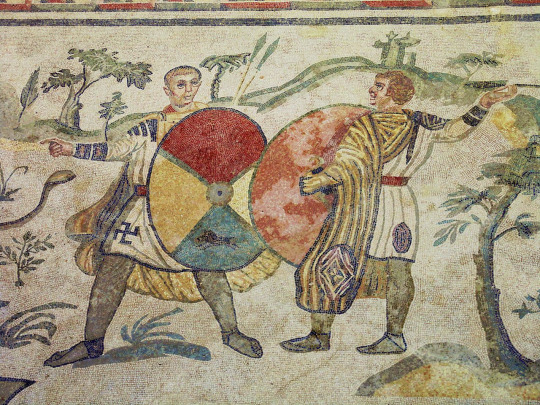
All over Europe thorough the early Middle Ages, the clothes were very similar in their basic shape and construction as in Rome and Greece. In Central and Northern Europe though people would wear pants under shorter tunics. There were exceptions to the everyone wearing a tunic trend. Celtic men wore braccae, which were pants, and short tunics and literally just shirts. Celts are the rare case, where I think we can say that men didn't wear dresses. Most other peoples in these colder areas wore at least knee-length tunics. Shorter tunics and trousers were worn again mostly by soldiers and slaves, so rarely any other woman than slave women. The trousers were though definitely trousers in Early Middle Ages. They were usually loose for easier construction and therefore not that similar to Roman leggings. However leggings style fitted pants were still used, especially by nobility. I'd say the loose trousers are a gray area. They wore both dresses and pants, but still definitely dresses. I'd say this style was very comparable to the 2000s miniskirts over jeans style. First one below is a reconstruction of Old Norse clothing by Danish history museum. The second is some celebrity from 2005. I see no difference.
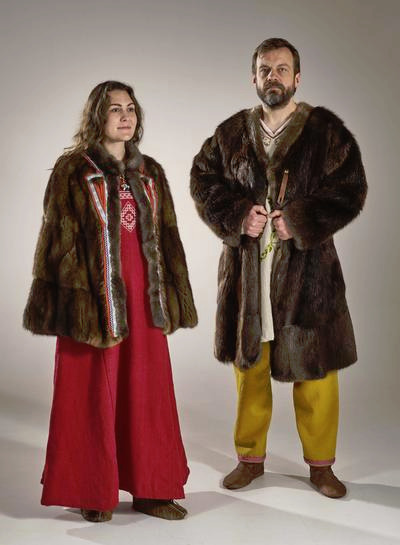

When we get to the high Middle Ages tunics are still used by both men and women, and still it's length is dependent on class and activity more than gender, but there's some new developments too. Pants and skirt combo is fully out and leggings' are back in in form of hose. Hose were not in fact pants and calling them leggings is also misleading. Really they are socks. Or at least that's how they started. As it has become a trend here they were used by everyone, not just men. During early Middle Ages they were worn often with the trousers, sometimes the trousers tucked inside them making them baggy. In high Middle Ages they became very long when used with shorter tunics, fully displacing the need for trousers. They would be tied to the waist to keep them up, as they were not knitted (knitting was being invented in Egypt around this time, and some knitting was introduced to Europe during middle Ages, but it really only took off much later during Renaissance Era) and therefore not stretchy. First picture is an example of that from 1440s. Another exciting development in the High Medieval era was bliaut in France and it's sphere of influence. Bliaut was an early attempt in Europe of a fitted dress. And again used by both men and women. The second illustration below from mid 12th century shows a noble man wearing a bliaut and nicely showing off his leg covered in fitted hose. Bliaut was usually likely fitted with lacing on the sides, but it wasn't tailored (tailoring wasn't really a thing just yet) and so created a wrinkled effect around the torso.
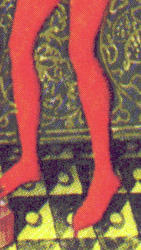

In the 14th century things really picked up in European fashion. European kingdoms finally started to become richer and the rich started to have some extra money to put into clothing, so new trends started to pop up rapidly. Tailoring became a thing and clothes could be now cut to be very fitted, which gave birth to fitted kirtle. At the same time having extra money meant being able to spend extra money on more fabric and to create very voluminous clothing, which gave birth to the houppelande.
Kirtle was once again worn by everyone. It wasn't an undergarment, for women that would be shift and men shirt and breeches, but it was an underlayer. It could be worn in public but often had at least another layer on top of it. The bodice part, including sleeves were very fitted with lacing or buttons (though there were over-layer kirtles that had different sleeves that changed with fashions and would be usually worn over a fitted kirtle). Men's kirtles were short, earlier in 14th century knee-length but towards the end of the century even shorter styles became fashionable in some areas. First picture below shows a man with knee-length kirtle from 1450s Italy.
Houppelande was also unisex. It was a loose full-length overgown with a lot of fabric that was gathered on the neckline and could be worn belted or unbelted. The sleeves were also wide and became increasingly wider (for men and women) later in the century and into the next century. Shorter gowns similar in style and construction to the houppelande were also fashionable for men. Both of these styles are seen in the second picture below from late 14th century.
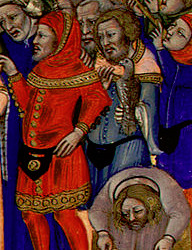
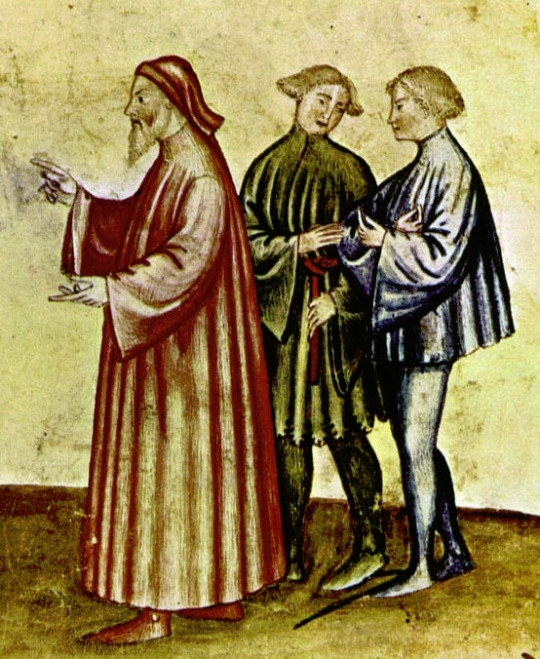
In the very end of 14th century, first signs of pantification of men can be seen. In France and it's sphere of influence the skirt part of the kirtle became so short it barely covered the breeches as seen below on these fashionable musicians from 1395-1400 France. Long houppelandes, length ranging from floor to calf, were still used by men though (the second picture, 1414 France), as were knee and thigh length gowns of similar loose style.
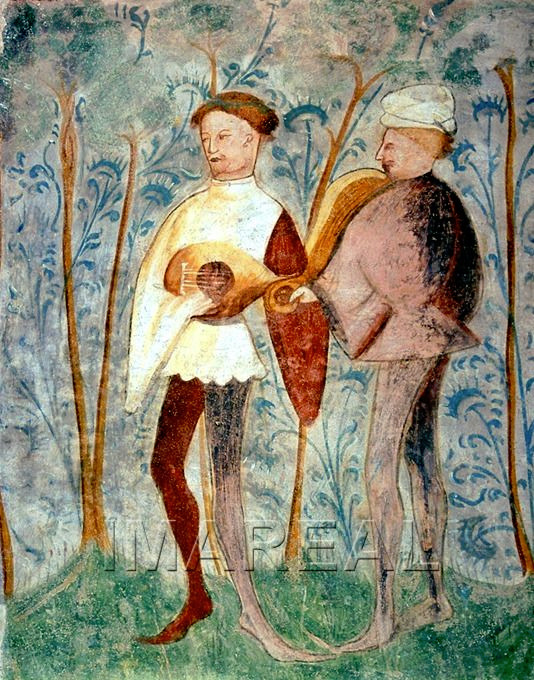
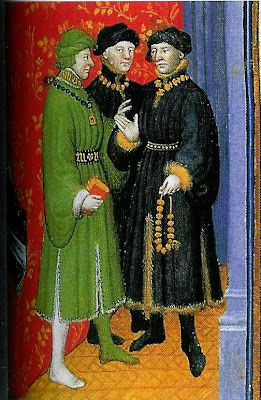
The hems continued to be short through the 15th century in France, but in other places like Italy and German sphere of influence, they were still fairly long, at least to mid thigh, through the first half of the century. In France at some point in late 13th century the very short under-kirtle started to be called doublet and they are just getting shorter in 1400s. The showing underwear problem was fixed by joined hose and the codpiece, signaling the entrance of The Sluttiest Era of men's fashion. Below is an example from 1450s Belgium of doublet and early codpiece in display. As you can see from the other figures, the overgowns of the previous century were also getting very, very short. In the next French example below from 1470s we can see the skirt shrink out of existence right before our eyes.
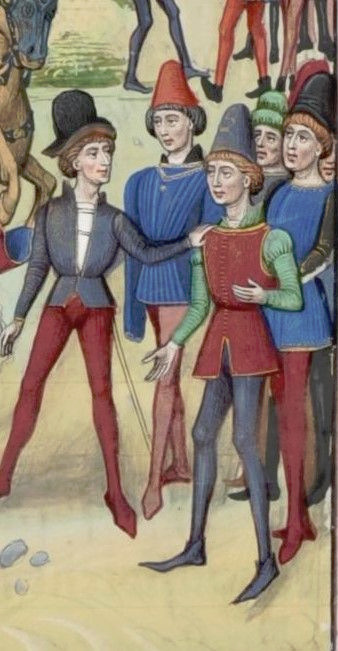
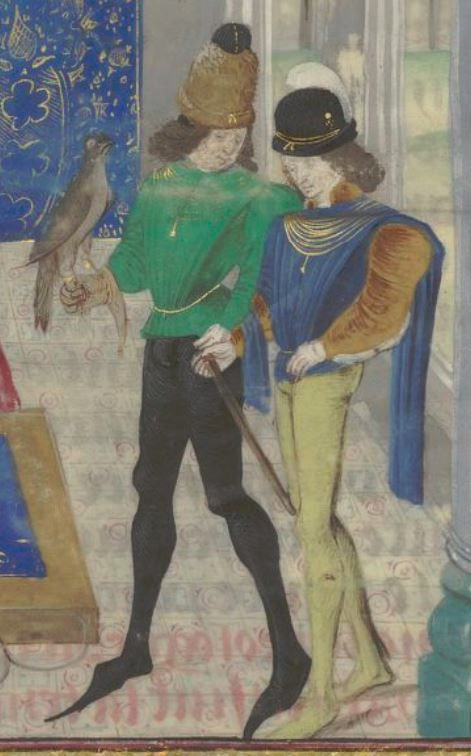
The very skimpy doublet and it's accompanying codpiece spread to the rest of the Europe in the second half of 15th century and it would only get sluttier from there. The Italians were just showing their full ass (example from 1490s). The dress was not gone yet though. The doublet and codpiece continued to be fashionable, but the overdress got longer again in the French area too. For example in the second example there's Italian soldiers in a knee length dresses from 1513.
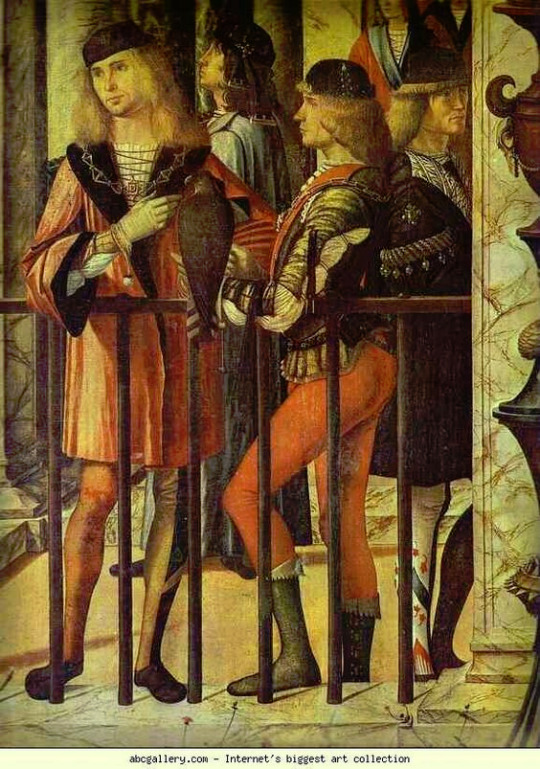
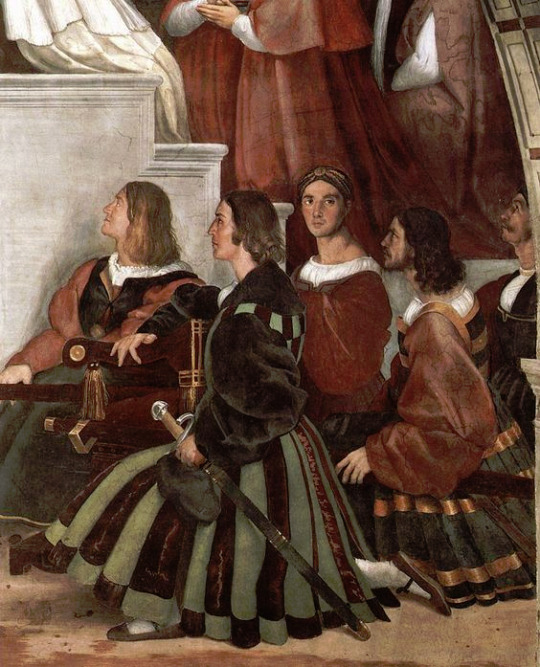
But we have to talk about the Germans. They went absolutely mad with the whole doublet and codpiece. Just look at this 1513 painting below (first one). But they did not only do it sluttier than everyone else, they also changed the course of men's fashion.
Let's take a detour talking about the Landsknecht, the mercenary pikeman army of the Holy Roman Empire. (I'm not that knowledgeable in war history so take my war history explanation with a grain of salt.) Pikemen had recently become a formidable counter-unit against cavalry, which earlier in the Medieval Era had been the most important units. Knights were the professional highly trained cavalry, which the whole feudal system leaned against. On the other hand land units were usually not made of professional soldiers. Landsknecht were formed in late 15th century as a professional army of pikemen. They were skilled and highly organized, and quickly became a decisive force in European wars. Their military significance gave them a lot of power in the Holy Roman Empire, some were even given knighthood, which previously wasn't possible for land units, and interestingly for us they were exempt from sumptuary laws. Sumptuary laws controlled who could wear what. As the bourgeois became richer in Europe in late Middle Ages and Renaissance Era, laws were enacted to limit certain fabrics, colors and styles from those outside nobility, to uphold the hierarchy between rich bourgeois and the nobles. The Landsknecht, who were well payed mercenaries (they would mutiny, if they didn't get payed enough), went immediately absolute mad with the power to bypass sumptuary laws. Crimes against fashion (affectionate) were committed. What do you do, when you have extra money and one of your privileges is to wear every color and fabric? You wear every color and fabric. At the same time. You wear them on top of each other and so they can be seen at the same time, you slash the outer layer. In the second image you can feast your eyes on the Landsknecht.

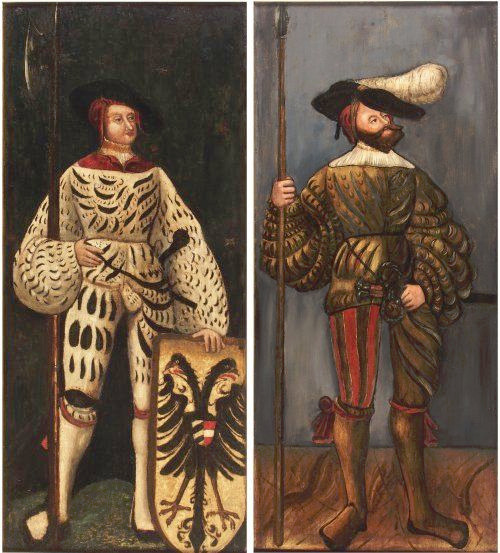
Just to give you a little more of that good stuff, here's a selection of some of my favorite Landsknecht illustrations. This is the peak male performance. Look at those codpieces. Look at those bare legs. The tiny shorts. And savor them.
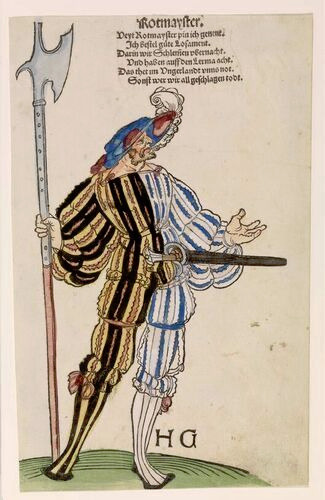
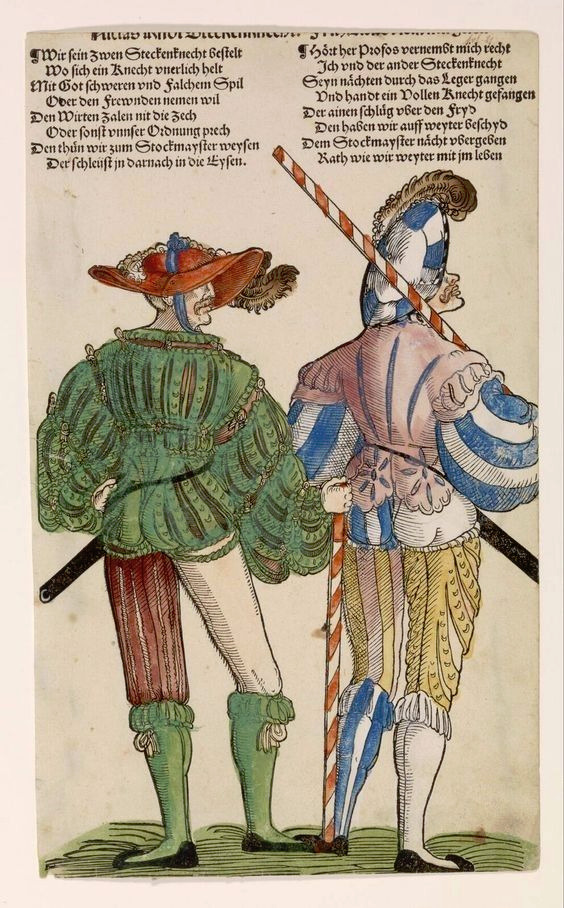
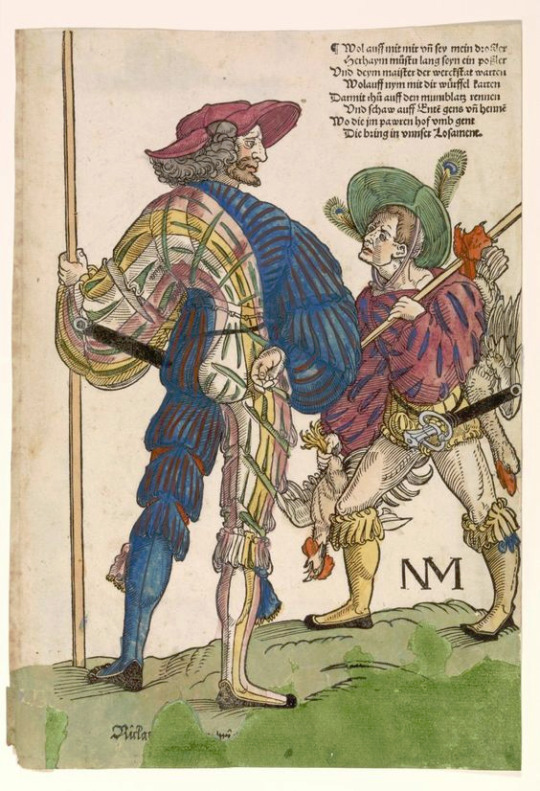
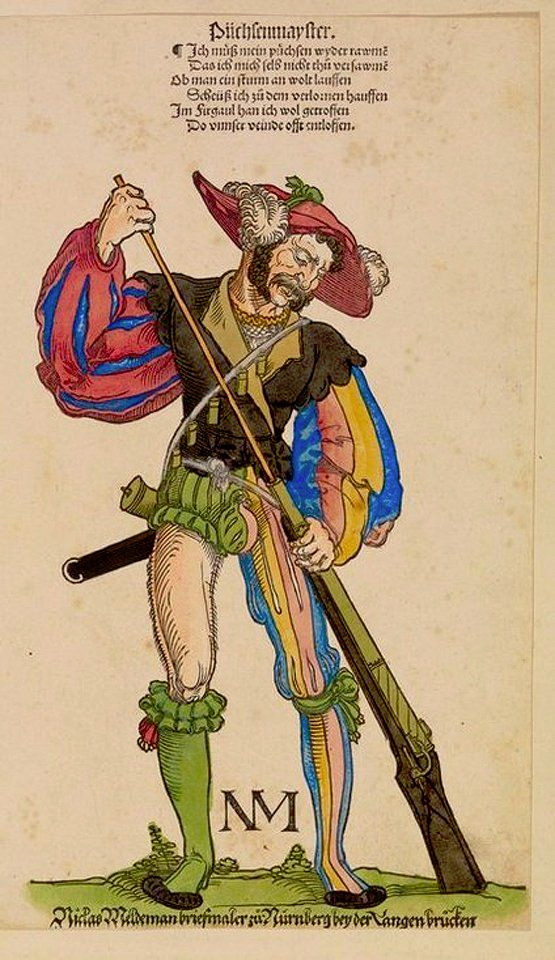
The Landsknecht were the hot shit. Their lavish and over the top influence quickly took over men's fashion in Germany in early 1500s. Slashing, the technique possibly started by them, but at least popularized by them, instantly spread all over Europe. That's how you get the typical Renaissance poof sleeves. They at first slashed the thighs of their hose, but it seems like to fit more of everything into their outfits, they started wearing the hose in two parts, upper hose and nether hose, which was a sort of return to the early Medieval trousers and knee-high hose style. The two part hose was adopted by the wider German men's fashion early in the century, but already in 1520s had spread to rest of Europe. It was first combined with the knee-length overdress that had made it's comeback in the turn of the century, like in this Italian painting from 1526 (first image). At this point knitting had become established and wide-spread craft in Europe and the stockings were born, replacing nether hose. They were basically nether hose, but from knitted fabric. The gown shortened again and turned into more of a jacket as the trunk hose became increasingly the centerpiece of the outfit, until in 1560s doublet - trunk hose combination emerged as the standard outerwear (as seen in the second example, 1569 Netherlands) putting the last nail on the coffin of the men's dress as well as the Sluttiest Era. The hose and doublet became profoundly un-slutty and un-horny, especially when the solemn Spanish influence spread all over with it's dark and muted colors.
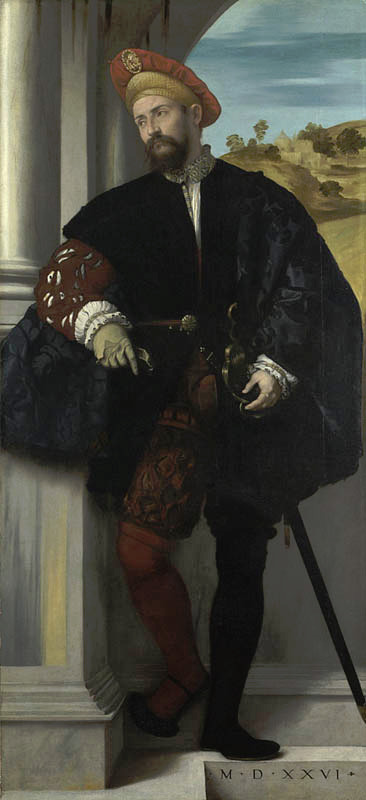
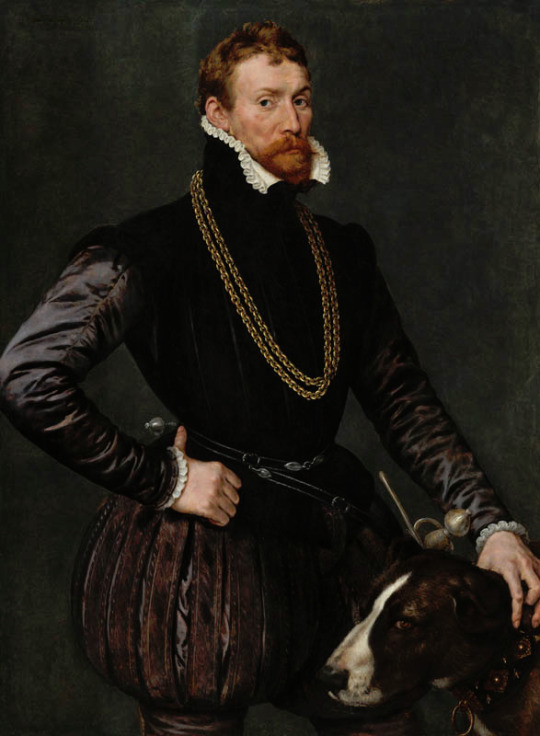
Especially in Middle Ages, but thorough European history, trousers have been associated with soldiers. The largely accepted theory is that trousers were invented for horse riding, but in climates with cold winters, where short skirts are too cold, and long skirts are still a hazard when moving around, trousers (with or without a short skirt) are convenient for all kinds of other movement requiring activities like war. So by adopting hose as general men's clothing, men in 1500s associated masculinity with militarism. It was not a coincidence that the style came from Landsknecht. I may have been joking about them being "peak male performance", but really they were the new masculine ideals for the new age. At the time capitalism was taking form and European great powers had begun the process of violently conquering the world for money, so it's not surprising that the men, who fought for money and became rich and powerful doing so, were idealised.
Because of capitalism and increasingly centralized power, the feudal system was crumbling and with it the feudal social hierarchy. Capitalism shifted the wealth from land ownership (which feudal nobility was built upon) to capital and trade, deteriorating the hierarchy based on land. At the same time Reformation and centralized secular powers were weakening the power of the Church, wavering also the hierarchy justified by godly ordain. The ruling class was not about to give up their power, so a new social hierarchy needed to form. Through colonialism the concept of race was created and the new hierarchy was drawn from racial, gender and wealth lines. It was a long process, but it started in 1500s, and the increasing distinction between men's and women's fashions was part of drawing those lines. At the same time distinctions between white men and racialized men, as well as white women and racialized women were drawn. As in Europe up until this point, all over the world (with some exceptions) skirts were used by everyone. So when European men fully adopted the trousers, and trousers, as well as their association to military, were equated with masculinity, part of it was to emasculate racialized men, to draw distinctions.
Surprise, it was colonialism all along! Honestly if there's a societal or cultural change after Middle Ages, a good guess for the reason behind it is always colonialism. It won't be right every time, but quite a lot of times. Trousers as a concept is of course not related to colonialism, but the idea that trousers equal masculinity and especially the idea that skirts equal femininity are. So I guess decolonize masculinity by wearing skirts?
#this has been sitting in my drafts almost finished for like a year or something#historical fashion#fashion history#fashion#history#dress history#men's historical fashion#renaissance fashion#medieval fashion#western fashion#western fashion history#landsknecht
3K notes
·
View notes
Text
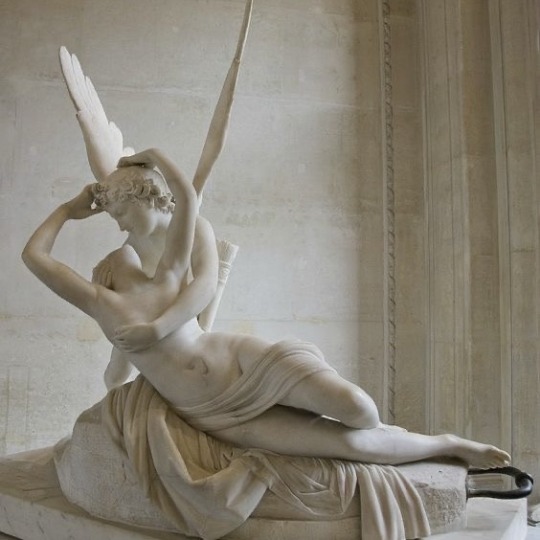
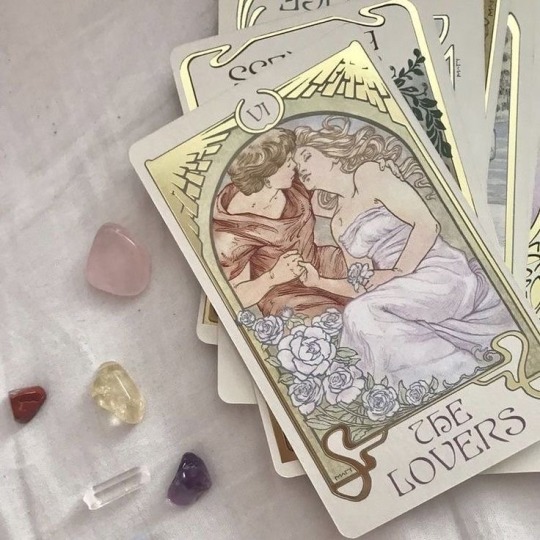

I CAN FIX HIM (NO REALLY I CAN)
masterlist | rules
❝ Can you please writhe a one shot with Jason and daughter of Psyche reader based on the song “I can fix him(no really i can)” by Taylor?Like imagine some time later when Jason is finally free from his demigod duties and goes to college with his friends,here he meets reader.Since she is a daughter of Psyche (the goddess of the human soul)she understands him immediately and she help him understand himself,discovering what he likes and to heal from his past and of course they fall in love. ❞ — anon
in which they shook their heads saying “god help her,” when you tell ‘em he’s your man
pairing jason grace x psyche!reader
warnings feelings of self loathing, slight bullying
on the radio . . . i can fix him (no really i can) (taylor swift)
an they r in new rome uni in this !! i feel like jason is a tad ooc but also its 11:30pm as im posting this and im tired
Everything you heard about Jason Grace screamed ‘red flag’. Son of Jupiter, ex-praetor, raised by wolves then sent to camp at the mere age of three or four - what was there not to be afraid of? To add to that, the way he carried himself exuded power in a way that would make anyone cower in fear. His face was inscrutable, crystal blue eyes unreadable in the same way the storms his father made were
However, you weren’t anyone. Your mother was Psyche, goddess of the soul. And as a daughter of Psyche, you could see right through just about everyone, including Jason Grace. Whenever you tapped into his energy, you couldn’t help but feel he was the complete opposite of what he presented himself as. While Jason seemed content with solitude to everyone around him, you knew that deep down, he was just seriously misunderstood and in desperate need for some loving
You were right. Jason’s life had been hell, especially the past couple years. His memory had been taken away from him, making him lose ties with all his friends and a potential lover, Reyna. Then, he’d gotten a new girlfriend and new friends, only for his girlfriend to dump him and his friends to all be too busy to spend a single second with him. Still, Jason had persevered. He applied and got accepted to New Rome University, he attended all his lectures, he got perfect grades, he tried his best to socialise.
The latter never worked out though. People either saw him as Jason the traitor, the guy who’d chosen to leave with the Greeks instead of fighting for his camp (Jason would stifle a laugh at the phrase ‘his camp’ - if this were really his camp, they wouldn’t have easily found a guy who’s the epitome of everything un-Roman to replace him. They weren’t any better), or as Jason the soldier, the man who’d toppled Kronos’ throne and won in a fight against the titan Krios, absolutely untouchable and worshipped in a way that would make his father seethe with jealousy
Eventually, he gave up. If that’s how they wanted him to be, so be it. He shut himself off from the world, focusing solely on his studies and his plans for shrines for every God and Goddess. Little did he know, a certain someone was formulating the perfect plan to become his friend
Your plan backfired. You’d spent weeks keeping note of all the classes you had with Jason, even occasionally following him to see where he’d go after class (his dorm, immediately), and yet you couldn’t seem to get a single conversation out of him. The closest you’d gotten was when you sat next to him in one of your lectures and dropped your pen - he’d simply handed it to you without a word. For the split-second your fingers brushed, you took on all his pain and felt it pull you apart. How could he cope with all of this baggage?
Luckily for you, the fates work in mysterious ways that in this case, happened to be in your favour
“Oh, I’ll leave. Sorry.” Someone mumbled from behind you. You had been having a hard time sleeping as it was exam season, meaning everyone’s late night stress as they did last minute cram sessions piled onto you, so you decided to go to the one place you knew would be quiet. It was a small garden you’d discovered as a freshman and dubbed as ‘your spot’, and you’d often come when you were feeling extra overwhelmed
Turning your head, your eyes widened as you saw none other than Jason Grace, who was about to go back to his dorm
“No, wait! You can stay, I don’t mind,” this was a first for Jason. Usually, people would go the other way at the sight of him, not offer to let him sit with them. He felt a gut-wrenching, yearning feeling in his stomach, and you felt it too. Softly, you patted the spot on the bench next to you. It was quiet between you, but with that simple gesture, you had made an everlasting mark in Jason’s mind
After that night, instead of leaving his bag on the seat next to him, Jason would put it on the floor in hopes that you’d see the empty seat and choose to sit there. You, ever the empath, did. The more you sat with Jason, the more words were said between you. You started the conversations, of course, asking him about his day and telling him about whatever minor inconvenience you had that morning
“I ran out of toothpaste,” Jason had said to you one day as you took your laptop out of your bag. This was his first time initiating a conversation. He wasn't sure why he did it, and cringed internally the moment those words came out of his mouth - toothpaste, Jason, really? - but you’d smiled and asked if he wanted to come with you to the shops after class, since you also needed to stock up on some supplies
That was the day Jason’s walls began crumbling down. Suddenly, he seemed to loosen up. His posture slackened and he smiled more often, told more jokes and even engaged in your banter. People gave the two of you weird looks as you walked around New Rome in fits of laughter, but neither of you cared
Well, not until one fateful day. Jason had been making his way to class with two coffees in hand, one for you and one for himself, when he’d overheard two people deep in conversation. He’d never been one to eavesdrop, but when he heard your name being mentioned, he couldn’t help himself
“That poor girl, she has absolutely no idea what she’s getting herself into,” one of them said. The other hummed in agreement, pity laced in his voice
“She thinks she’s doing a good thing, being friends with him and all, but he’s just going to break her heart like he did Reyna’s. Jason Grace is no good.”
He nearly dropped his coffees. Suddenly, all the confidence he’d built came crumbling down, being quickly replaced with those walls he knew all too well, the only things he could trust other than you. Since he loved you so dearly, this was for the best. You’d find some other guy to befriend eventually. If all of Camp Jupiter could replace him after years of service, who’s to say you couldn’t after a couple months of being friends?
Coincidentally, you happened to be looking for Jason when you saw him standing there, a blank look on his face - the same one people had warned you about in your first year at NRU. This time, however, they didn’t have a fighting chance in fooling you. Even without your powers from being Psyche’s daughter, you knew Jason was a sweet guy with the kindest heart
“Jason, are you alright?” You asked, reaching to place a tender hand on his shoulder. He pulled away and your face dropped as you tuned into his feelings and realised the old Jason was making a comeback. It’s not like he’d ever been gone, no one ever gets rid of lifelong trauma and horrible experiences that quickly, but Jason’s aura hadn’t felt that self-loathing in a very long time
Looking behind you, you saw a couple give you a pitying look and the pieces clicked immediately. Scowling at them, you took Jason by the arm and dragged him to that garden where you first spoke. The garden that was no longer just your spot
“Whatever they said, I don’t care,” you told him, “they’re wrong, Jason. You can’t listen to them. From the moment I met you I knew they were wrong. Don’t let them win.” His eyes stared into yours, completely emotionless. His guard was up, and you didn’t know why (slight btd ref!!). Didn’t he trust you?
His voice monotone, Jason replied, “this isn’t just about them, Y/N. You have no idea what I’ve been through. You don’t deserve to have to deal with that, it could affect you too. You could be making so many friends right now and yet you haven’t, because you chose to stick with me.”
The tension rose between you and you knew there was only one thing you could do: succumb to the pull he had on you once and for all. Grabbing him by the collar, you pulled Jason closer to you and kissed him fiercely
When you pulled away, you took a second to take in Jason’s dishevelled look before replying, “I don’t care. I’ll choose to stick with you in every lifetime.”
#jason grace x reader#jason grace x you#jason grace x y/n#jason grace#jason grace x fem reader#pjo#pjo x reader#jason grace fanfic#jason grace drabble#percy jackson x reader#jason grace x psyche reader#daughter of psyche#psyche pjo#cynwrites
194 notes
·
View notes
Text
where in the locked tomb universe are we?
or: a tentative guide to the solar system in the locked tomb and which houses go where :)
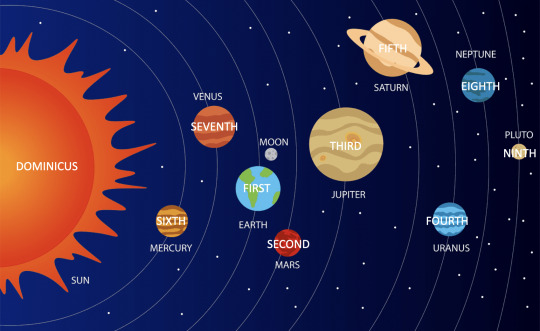
[id: a diagram of the solar system, including pluto, with additional white text overlaid over each body. the sun is labeled dominicus, mercury is labeled the sixth, venus is the seventh, earth is the first, mars is the second, jupiter is the third, saturn is the fifth, uranus is the fourth, neptune is the eight, and pluto is the ninth. /end id]
note: i'm pretty sure people have put together similar analyses before, but i wanted to try my own hand at it! and please feel free to share if you disagree with me on anything & your own evidence and thoughts <3
evidence & analysis under the cut!
THE NINTH HOUSE:
okay, this one is pretty much just a freebie. if you didn't know that the ninth house was on pluto, then, uh... sorry! i'm not going to exhaustively go through all the evidence for this one, but some things that stick out are the cold, gideon's awe at how close the first house is to the sun, and the fact that it's the "ninth" to begin with—the house that wasn't really meant to exist, perfectly in line with the planet that isn't really a planet
THE FIRST HOUSE:
this one is given to us just as much, if not moreso, than the ninth. with that in mind, i'm just going to do a quick run through of the evidence that the first house is earth: it's very blue and covered in water, there are ruins of civilization, it's "the first", so on and so forth. home, sweet home :)
THE SIXTH HOUSE:
Then he said, "The sun has stabilized. Hope the Sixth House didn't get cooked in the flare." (Harrow the Ninth, 490)
this line is pretty much the entire selling point for the sixth being on mercury, the closest planet to the sun! (until they run away to the other side of the universe, that is)
THE SEVENTH HOUSE:
There were other planets that made their homelands closer to the burning star of Dominicus--the Seventh and Sixth, for instance--but to Gideon they could not imaginably be anything else than 100 percent on fire. (Gideon the Ninth, 67)
the implication here is fairly obvious: the seventh and sixth are on venus and mercury, or vice versa. thankfully, since we have the sixth squared away as mercury, it's pretty obvious that the seventh is located on venus
BONUS MYTHOLOGY FACT: venus is the roman goddess of beauty! (also known by her greek name, aphrodite). "seven for beauty that blossoms and dies", huh?
THE EIGHTH HOUSE:
"I squeal so long and so loud that they hear me from the Eighth." (Gideon the Ninth, 26)
while this line is obvious hyperbole, to me it implies one of two things: either the eighth is the farthest planet from the ninth, or it's right next to them. and since we know that mercury already has its hands full with sixth house, i think it's safe to assume that the eighth is on neptune, the ninth's next door neighbor :)
THE SECOND HOUSE:
"We went through the same shitty questions of what to do. What about the Mars installation, what about the fusion batteries?" (Nona the Ninth, 74)
john helpfully offers this tidbit to us when he's recounting everything that happened leading up to the apocalypse to harrow. i think it says a lot that there was a mars installation even before the apocalypse properly hit, and it makes sense that said installation would eventually become a proper House, with a capital H
BONUS MYTHOLOGY FACT: mars is the roman god of warfare (known in greek as ares)! looks at the second house and how closely they're associated the cohort... yeah, i think that speaks for itself
THE THIRD & FIFTH HOUSES:
"I thought we'd end up on the Third or the Fifth, or a sweet space station, or something." (Gideon the Ninth, 56)
"We are not becoming an appendix of the Third or Fifth Houses," continued the necromancer opposite." (Gideon the Ninth, 58)
okay, here's this bit where things begin to get a bit hairy. repeatedly throughout the books, we're told about how the third and fifth are the two "big" houses. harrow's scared of them and worried they'll make the ninth one of their appendixes, gideon originally thinks the entire lyctoral meeting will be on one of their planets, so on and so forth. with that in mind, it really isn't that much of a stretch to think they'd be situated on the two giants in our solar system: jupiter and saturn. we'll come back in a moment to sort out which is which!
THE FOURTH HOUSE:
aaaand uranus is the only planet left! congrats, fourth!
THE THIRD & FIFTH HOUSES (again):
"Naturally [Isaac] is Pent's protégé. I hear the Fifth takes special pains with the Fourth... hegemonic pains, some may say." (Gideon the Ninth, 170)
from this quote, as well as the whole of jeannemary & isaac's relationship with magnus & abigail, we can surmise that the fourth house is very close to the fifth house (hegemonic though it may be). it's reasonable that that metaphorical proximity is reflecting (or caused by) something else: physical proximity. with that, i think it's fairly safe to assume that the fifth is on saturn, putting the third on jupiter
DOMINICUS:
aaand finally, the center of the solar system itself! i really, really don't think it needs sharing that dominicus is the sun, as long as you accept that the locked tomb takes place in our own solar system. however, i do think the meaning of dominicus is worth sharing. coming from latin, it translates roughly to "lordly", "belonging to god", or "of the master." very subtle, john, very subtle.
#shamsisms#tlt#the locked tomb#gideon the ninth#harrow the ninth#nona the ninth#god this post took me like 2 hours to put together. hii#i swear im going to find a typo as soon as i post this but. oh well. im not spending any more time on this post atm#also the page numbers are based on my paperback copies! i think they should be the same in hardcover but im not entirely sure
232 notes
·
View notes
Text
Asteroid Observations: Mommy Asteroids🍼
I will use the charts of 3 women who stand out in some way for being mothers to see how these asteroids play out in their charts. ⚠️Disclaimer: Having the same placement as these women will not guarantee that you for example will have twins, astrology can only show possibilites.
Ceres(1) - Roman goddess of fertility and motherhood.
Fama(408) - Goddess of rumor and fame.
Child(4580) - Children.
Demeter(1108) - Greek goddess of fertility.
Abundantia(151) - Abundance.
Feronia(72) - Roman fertility goddess.
Nadya Suleman (octomom)
Nadya Suleman known as Octomom in the media, is an American media personality who came to international attention when she gave birth to the first surviving octuplets in January 2009.

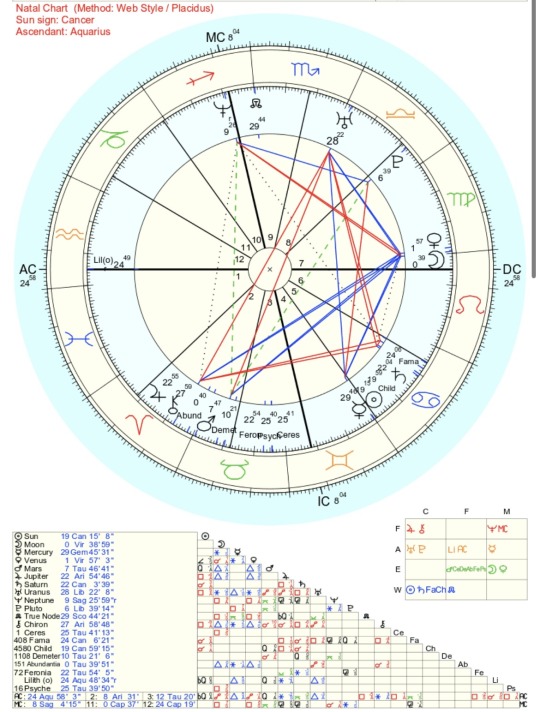
Child conjunct Sun: Her identity linked to her children.
Fama conjunct Child: Famous because of her children.
Midheaven at 8°: Known as octomom bc of giving birth to octuplets. She also got extreme strong reactions from the public when she became famous.
Abundantia conjunct Mars and Demeter: An abundance of children. Also her body going through a lot and being able to handle a lot. An abundance of strength. She have 14 children in total.
Uranus in a Cancer degree: Uranus shows where we shock people and where we are different. Uranus is also in the 9th house and her birthing octuplets led to a lot of new research being made ”The circumstances of their high order multiple birth led to controversy in the field of assisted reproductive technology as well as an investigation by the Medical Board of California of the fertility specialist involved.”
Kate Gosselin (kate plus 8)
Katie "Kate" Gosselin is an American television personality. She appeared on reality TV show Jon & Kate Plus 8, in which she and Jon Gosselin were profiled as they raised their atypical family of sextuplets and twins.


(No birthtime available)
Fama at 16° (a Cancer degree): Famous as ”kate plus 8”. Known for being a mom. Being a mom is her whole image.
Child in Gemini: She gave birth to twins before she have birth to the sextuplets.
Ceres conjunct Sun: Known to be a mom. Ceres is also in a Gemini degree(twins)
Feronia conjunct Abundantia: she definitely had an abundance of children.
Demeter at 8°: As the name Kate plus 8 says, she got 8 children.
Kris Jenner
Kristen Mary Jenner formerly Kardashian is an American media personality, socialite, and businesswoman. She rose to fame starring in the reality television series Keeping Up with the Kardashians with her family.

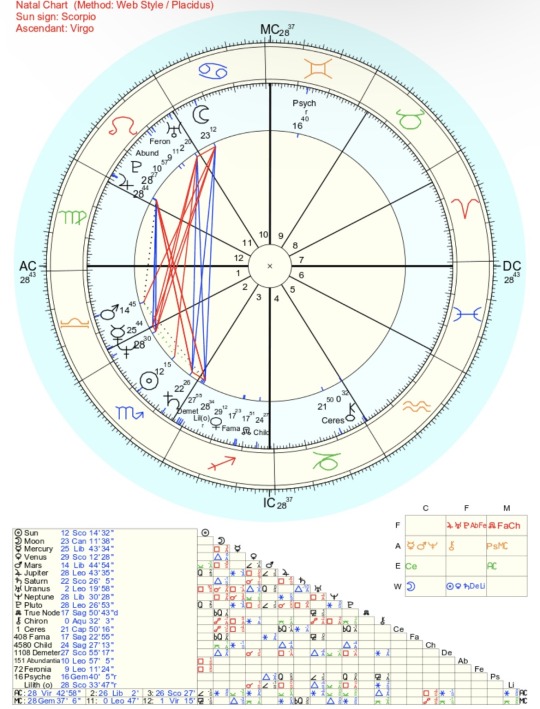
Fama conjunct North Node & Child: Famous mostly bc of her children(yes i know her husband was successful) but we mostly recognize her as Kims mom. Having famous children. Fama and North Node are both in a Leo degree too.
Demeter conjunct Lilith: She is a real Lilith mom. Almost everyone of her children have Lilith influence: Kim: Lilith conjunct Sun, Khloe: Lilith conjunct Ascendant, Kylie: Lilith conjunct Venus, Kourtney: Lilith conjunct North Node and Saturn, Kendall: Lilith conjunct IC. Her Lilith is also in a Cancer degree.
Moon in the 10th house: Known as the Kardashian/Jenner mom. She is CEO of her own production company, ”Jenner Communications”. Kris manages the careers of her six children, Kourtney, Kim, Khloé, Rob, Kendall and Kylie.
Midheaven and Ascendant in a Cancer degree: When you see her you think mom. She is also her childrens manager.
Asteroids mentioned: 1, 408, 4580, 1108, 151, 72, h13, 16
©️ 2023 Zeldas Notes
#astro notes#astrology#astro observations#astronotes#ascendant#lilith#ceres#asteroids#birth chart readings#demeter
278 notes
·
View notes
Text


full body commissions, at long last!
the base price is $100 for a single figure, and then you add on the price for colors if you want that! flat color prices vary on complexity. if you have someone in a suit, then it's just +$30, but it's more like a complex period costume, then it's closer to +$40-50 (same for simple renders)
(simple renders are not an additional fee on top of the flat colors! I realize that it might be a little confusing, flat colors + simple renders is it's own thing, which starts at +$40)
anything over $100 can be paid either in it's entirety up front, or $100 up front, and the rest once completed (for this, I'll send a lower resolution jpeg of the finished illustration when it's finished, and the high res png when the payment goes through)
visual references are a big help! either art of the character, or things like a face claim or actor. if you have a character from a specific time period, please also send references of the clothes you'd like them in! if you have a pose in mind, feel free to tell me! It can be anything from standing around, to sitting down, jumping, etc.
these prices are for private commissions only! which means you can go ahead and get 'em printed or whatever for your own personal use but you can't use them commercially
currently, I don't have prices for a commission with a second full body figure! if you really want something like that, we can work out a price.
I'm also using a dead line weight in these examples, but if you want something that looks more like the inking style that I use in Trikaranos, just let me know!
🍊 commissions will be on a 10x15 in canvas at 300dpi :)
🍊 email me at [email protected], and we can talk details! I use paypal for payment, do not send me money ahead of time because this is not my paypal email and I use invoices.
if I don't reply in like, a day, feel free to message me here and I'll give you my other email where we can hash out details because sometimes, the perils of having an email on public display is that people will sign your email up for junk mail and it takes a minute to mark it all as spam
things I'll draw: established characters, ocs, your favorite dead roman or greek hero, I'm cool with it all!
things I won't draw: generally, I'm not too keen on drawing anyone under 18, as you may realize from the fact that many characters on my blog are vaguely in their 30s. like, it's not a hard rule, but I will fully admit right here that I'm better at drawing people over 20.
(also! again. money this month sucks, and the economy is honestly just a huge bummer for literally everyone everywhere. if my prices for full body comms are out of your range, I'm cool to do payments in $50 a month installments!)
#also my finances are a little yikes this month: if you get a full body commission i'll also throw in a little thank you head sketch of your#character. but that's a secret. shhhh.#commissions tag
155 notes
·
View notes
Text
While checking around for my “Roman gods are not Greek gods” posts, I found back this tripartition of mythology, which is actually a fact that everybody should kno about if they want to dabble in Greco-Roman myths (especially Greek myths).
We know that, during Antiquity, the Romans and the Greeks thought that there wasn’t just one, but three different types of “theology” - three different views, perceptions and reception of the gods.
The first theology was the theology of the priests and of the state - aka, religion. The Greek gods as perceived and described by religion, as honored through rituals and festivals.
The second theology is the “mythic theology” - what we call “mythology today”. It is a set of legends, folktales and stories that are not part of religion, but rather used and carried by art - it is the gods are seen, perceived and described by the poets, by the epics, by the theater plays.
The third theology is the theology of the philosophers - who used the gods and their tales as images and allegories for various abstract or concrete topics. It is the gods as depictions and description of natural phenomenon, or the myths as a way to actualy exemplify a social fact or explain psychological workings.
For the classic Greeks and Romans, there was a clear divide between those three very different point of view of the gods. It was basically three different versions of the pantheon. This is notably why you will find texts noting that priests disliked and condemned the poets’ mythological works, due to them being blasphemous and making the gods too human when religion described them as perfect ; and it is also why the philosophers of old dissed on and rejected the literary works of mythology as nonsense only good to feed superstitions, because for them the gods weren’t characters or realities, but rather abstract concepts and rhetorical allegories.
This is something I feel needs to be reminded, because today these three different theologies have been mixed up into one big mess - as literary myths are placed one the same level as philosophical “myths” (actually texts taking the shape of myths), and both considered of outmost religious importance. When in fact, things were quite different...
EDIT: I was asked if there was a myth that could illustrate the three different theologies, and on the spot I would say “the affair between Aphrodite and Ares”.
This story originates from the “mythological theology”. It is primarily a story, and a good one. It is the story of a husband who discovers his wife is unfaithful and tries to get revenge, it is the story of an extra-marital affair gone wrong, it is typical set of divine shenanigans ending on a grotesque display of divine humiliation - it is an excellent narrative material for plays and poems (and the legend does originates from poems).
The story was also dearly beloved and reused by the “philosophical theology”, because the philosophers adored the idea of the love between Ares and Aphrodite - for them it was the perfect depiction of how the concepts of “love” and “war” , despite being seemingly opposite, attracted each other and were closely tied. For them, this story isn’t to be taken literaly as “a god cheated on another god”, but rather as “this is an allegory showing that love and war are two sides of the same coin, which is why Aphrodite falls for Ares despite being married to Hephaistos”. But for them the whole net part is just poetic nonsense invented to make people laugh ; or maybe they will reinvent them as a moral, cautionary tale that should be used to warn people of the dangers of unfaithfulness.
And then there’s the “religious theology”, the point of view of the priests - for whom such a story is mockery and sacrilege. You can imagine them saying: “You are making the gods look like fools! Gods don’t cheat on each other, gods don’t get captured in nets while butt-naked, gods don’t even sleep on beds - GODS DO NOT EVEN HAVE HUMAN FORMS IN THEIR NATURAL STATE - what the heck is this bullshit you’re saying, you’re just insulting the gods by turning them into lecherous humans and grotesque clowns for your vulgar story!” (This is a reconstitution and not the actual words of an Ancient Greek priest)
#greek gods#roman gods#greek mythology#greek religion#roman mythology#roman religion#ancient theology
613 notes
·
View notes
Note
I've got a question (as per your post saying questions are welcome.) I hope you'll forgive me if I word things wrong and feel free to let me know so I can avoid doing it again.
So, I never really knew what Zionism was and I feel like I still barely know. Before I looked into it, all I had ever heard was people saying it with venom. From the way they spoke, I just assumed it meant something very aggressive and violent. To my knowledge SOME are violent but it doesn't seem accurate to say that Zionism is inherently violent or evil. I'm sure there's more I should know; It feels like I only barely, barely know the basics. In addition to any insights you might have in general, I guess I'd like to know: Is the Two-State solution technically Zionist, since Israel would continue to be a self-governing state? Am I Zionist or Zionist-ish if I believe in Jewish Indigeneity (while also believing in the indigeneity of the Palestinian people because more than one population can be indigenous to the same place.)
Also, and I apologize if it's inappropriate to make comparisons like this, it feels like the term "Zionist" is sort of used how "Communist" was used in Red Scare USA? It feels like it doesn't even mean anything other than "enemy" and is used to elicit a strong emotional reaction.
I want to learn more so that I don't perpetuate any stereotypes or continue in my ignorance. I'd also love any recommendations on books about Jewish History or the Levant! edenfenixblogs inspired me to read more about Jewish history with the recommendation of Night by Elie Wiesel, and I'd like to continue learning history beyond the Holocaust, too.
So first, your comparison of “Zionist” to “Communist re 1950s” is so spot-on I can’t believe I haven’t heard it before now. I just want to get that out front so I don’t forget later (ADHD goes whee).
So “Zionism” is sort of like “queer” in that it means a lot of different things to different people, but has core things that will always be true. Those things are thus:
1) the Jewish people are indigenous to the Levant;
2) many (though not all) Jews were forced to leave historic Israel and Judea due to Greek and Roman conquest and colonization, and this has gone poorly enough for us over the last two millennia that it’s clear we will not be safe until we have self-determination in our own country;
3) by virtue of being our ancestral and indigenous homeland, that country should be in the Levant.
That’s it, that’s Zionism.
I do want to point out there are Zionists who twist the word into pretzels in order to justify being horrible to others, particularly Palestinians. While I won’t no-true-Scotsman these people into not being Zionists, I will say they’re Zionists the same way the Taliban are technically Muslim. They’ve latched onto an otherwise-neutral label in order to have a bludgeon. That is not what Zionism should be, and for the majority of Zionists, it’s not.
93 notes
·
View notes
Note
could you share your thoughts on Christianity and the lgbt community? Not in a like "'oh yeah well how are you this and that if you're REALLY Christian"' kind of way, I'm asking from the perspective of someone who's been struggling with their spirituality because I don't know how I can believe and god and also be gay. Feel free not to answer this though, you shouldn't have to explain yourself to random people every time you mention your religion
There’s not a lot of mentions of what we would consider to be homosexuality in the Bible. Paul mentions it most explicitly but there’s some important things to remember about Paul. First, he’s just some guy. He did important work spreading the religion but that doesn’t mean that he’s right about everything. Second, his only exposure to homosexuality likely came from the Roman elite. And the way they did it usually involved raping slave boys and hiring young prostitutes. They didn’t usually have same sex relations in the way we think of them now. Men didn’t generally have romantic relationships with each other into adulthood and a full adult citizen being passive during sex was considered to be scandalous. Any actual romantic relationships between adults of the same sex were likely kept secret or at least weren’t talked about loudly. So Paul is living in this environment. And people aren’t completely separate from the environments they live in.
For the most part stuff in the Bible that’s translated as condemning homosexuality is referring to certain cultural practices common in the Mediterranean at the time that we also wouldn’t like today. Such as pederasty, also known as a romanticized form of pedophilia that even people at the time in cultures that practiced it heavily criticized. Consenting adults often did have romantic or sexual relations together but they weren’t commonly open about it.
Overall, the Bible just doesn’t have much to say about liking someone of the same gender if you look at instances outside of things alluding to some of the worse stuff the Greeks and Romans did. So if the Bible doesn’t say much about it, that leaves it up to us to logically deduce our personal feelings about it.
Okay. So what are the two main commandments Jesus gives us? Love your neighbor as yourself, and love god with all your heart, soul, mind, and strength. Basically: love God, love others, love yourself. These are said to be the rules that all other commandments stem from and supersede all other commandments in terms of importance.
So. Does being queer stop you from loving God? Loving others? Loving yourself?
Science is real. It helps us learn more and more about the universe God created all the time and science has proven time and time again that being queer isn’t a choice and that people are happier when they live more authentically.
God made you the way you are. You cannot control whether you’re queer or not. So it’s not a mistake in you that can be “fixed”. If humans were made in the image of God, you too are an image of God. So some tiny part of God, however small, looks like you. All of you. Including the queer parts.
So then. Are you loving God? Including the parts of God that are like you? Are you loving your fellow humans? Including your fellow lgbt humans? Are you doing your best to love yourself? Every part of yourself?
I don’t take the Bible fully literally. You can’t. It contradicts itself constantly. But even if you did, the world it was written for and the society that made the oral traditions it was based on no longer exist. At least not in the exact same way they once did. What the Bible does have in it is stories that can give us examples and have informed the formation of our culture as Christians. Christianity has changed a lot over the last 2,000 years. Many forms of it have come and gone. Ultimately it’s up to us as modern Christians what kind of world we want to be apart of and contribute to and what culture we want to make among ourselves. I can’t pretend to know the true nature of God but I do know that God inspires me to reduce suffering and speak up for injustice where I can.
Ultimately your interpretation is up to you. But I personally don’t see needless self flagellation over something you can’t control as an act of justice or love. Just a form of self torture that’s ultimately not adding much to the world. Adding some of your own happiness to the world in my opinion isn’t a problem.
If you want to know how being queer has affected my faith, I’ve never doubted for a second that being lgbt+ is fine. To be honest I’ve been more afraid of secular society not accepting me than God. God and I have wrestled before, but almost never over that. I am how I am and if God didn’t want me to be this way he probably wouldn’t have flipped the gay switch in my brain.
265 notes
·
View notes
Text
I love the idea of Jason Grace in the Lost Hero who's distrustful and taking things into his own hands.
Because he realises that everyone around him keeps feeding him lies.
That he's Leo's best friend, that he's Pipers boyfriend. That he's a son of Zeus. Jason doesn't know the truth but he instinctively knows that they're lying to him.
He's also smarter than people realise and starts putting together things that don't add up.
He has lighting powers but his skill set isn't the same as his sister Thalia (their familial tie being the only thing he's been told that Jason believes is true.)
He doesn't know any Greek but can speak Latin. He instinctively calls Greek deities by their Roman names.
Also if he just found out who he is, than why does Chiron know he's already been claimed?
And most glaringly, why does he have a coin in his pocket that can turn into a sword? A coin that has Julius Ceaser's face on it.
Julius Ceaser who's very famously Roman.
Also Jason has an SPQR tattoo that he somehow knows means the Senātus Populusque Rōmānus aka the Senate and the People of Rome.
So Jason's very fucking sure that he's not Greek like everyone keeps telling him. His memories may say otherwise but Jason doesn't know anything about himself other than his name.
So he just stops trusting those memories or relying on them for information.
Just the idea of Hera's plan being to build trust and instead because of what happened to Jason, he doesn't trust anyone.
Except Thalia because she's the only person who isn't lying to him. No one except Chiron is doing it on purpose of course but Jason doesn't know that.
85 notes
·
View notes
Note
https://www.tumblr.com/cardassiangoodreads/722229585723424768/im-just-going-to-say-right-now-that-i-dont-think?source=share
Just curious about your thoughts
The post and the tags because this person has blocked me preemptively - and they're lucky cause I wouldn't shat all over them. This person is a USAmerican very removed from Italian culture.
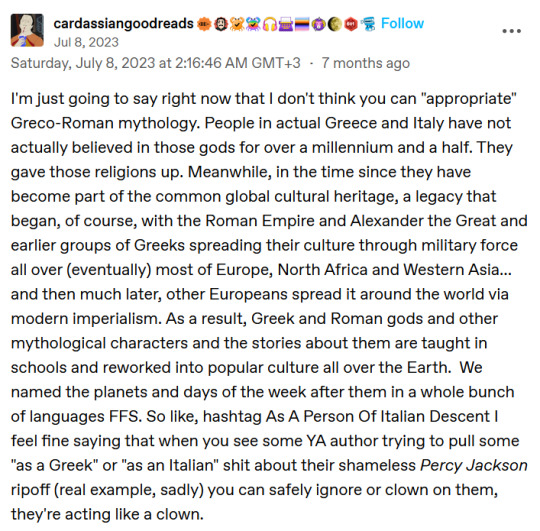
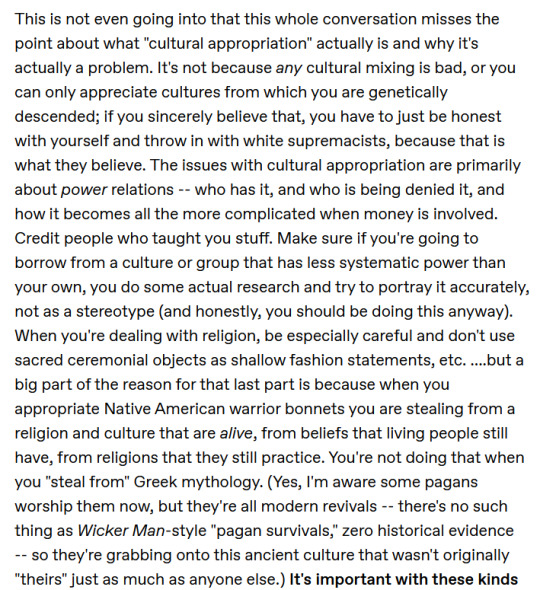
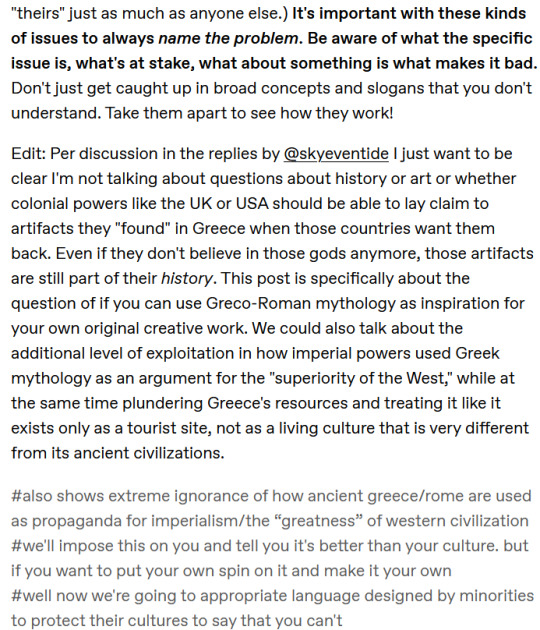
My Answer:
Ooooo coloniser rhetoric in the 21st century! That's a sight for sore eyes! (Which became sore cause they see such takes all the time).
Funny how this person talks about how objects belonging to Greece right after saying that our heritage figures (like our gods and heroes) don't belong to us. If Greek culture is a global culture why can't foreigners keep the objects? Hmmm I wonder…. They still put the "Greek" or "Roman" to characterise the stories but the moment Greeks and Italians speak up, then all of a sudden "the stories akksuually have no culture, they belong to all of us!" 😂😂😂
I wonder if this person understands what the term "heritage" means, because gods and heroes are definitely part of one's heritage and we never stopped preserving the texts that spoke about them, and they are still part of our living culture.
I'm all for listening to the members of the diaspora but when we are at the point when one of them is regurgitating imperialist points, not only there's a big divide with current opinions in Italy, but I also cannot leave such points unanswered. Also, many Italians, like Greeks, are sick of how their myths are treated but this person didn't even check, they just spoke over them. Because they didn't bother to ask people, obviously.
Ancient Greek heroes and gods still mean a lot to us. They always meant. They were born from visions, dreams, and other sacred methods, or oral traditions from our ancestors, reflecting specifically the ancient Greek culture. It's good that foreigners can access them and relate to a degree but divorcing any folk story from its origin is always negative. Especially when this culture is still ongoing.
Our Christianity is revamped ancient Greek religion, I wonder, does this person know that? Our temples have the same parts. We still have home altars, and divinities presiding over domains. Our hagiography is how we used to paint our gods and creatures. We still have almost the same nature creatures. The customs have remained and have persisted, and I won't have someone who clearly ignores this say "They gave the religion up". Ftou.
Also when it comes to our gods and their symbols (and yes btw we call them "our" gods lots of times), we can deduce things from our local tradition and environment, whereas an Anglophone who worships the gods or is interested in them but doesn't know stuff about the country of origin of those gods has no idea about our history, methods and environment. Example: Foreigner refuses to accept that there's a pine cone on Dionysos' thyrsos (although it looks like a pinecone) because "it doesn't make sense" and very excitedly suggests another plant instead. Greek lets them know that it is actually a pine cone not only because it looks like a pinecone but because the pinecone has been used in our winemaking process forever, and Dionysos also presided over this process. Guess Greece and its environment and it's people are still relevant to the religion, and it also turns out that the symbols of the gods derived from the Greek reality. Who knew!
Now onto another point. Op says that the Greek stories became "global culture" because they got shared everywhere. Them being shared is not a bad thing! However just studying them and be taught about them is not culture. By this logic, and since Egyptians "gave their old religion up", ancient Egyptian gods are now MY ancient gods because I can find books about ancient Egypt at my local bookstore. woww 😂 What about this? Almost every Greek knows 100 and 1 nights. We have made it into a play also. SOO... these are our cultural stories now, right? West Asians and Arabs in general shouldn't speak if they ever see us and other nations being ridiculous about the stories, and stereotypes and changing the characters a lot but still claim we are doing great, right? Got it.
The way this post is written it's like Germans and Brits kept the ancient Greek myths alive since ancient years or something. Greeks themselves never stopped preserving their own ancient texts, and they escaped with them in Europe after the fall of Constantinople, so NW Europeans REDISCOVERED them 1500 years later. They had lost interest by then.
Funny they mention different nations that were Hellenized or became Roman territories because people living in these nations are exactly those who don't speak about Greek and Roman culture as "a global culture". It's always North Westerners who start these discussions, I wonder why…..
People from the aforementioned nations already interact healthily with their ancient heritage - which is not Greek or Roman culture but always a local version with Greek or Roman elements, and that's great too. I haven't heard a Pakistani say "Theseus is our hero too!" or a Tunisian say "Zeus is our local ancient father of the gods!" Because they know exactly how the mix happened and what their national identity is. And I'm getting more and more tired of seeing Westerners erase these experiences too, and just make assumptions for other nations.
I swear I mostly see USians getting butthurt about other people getting conquered 2.000 years ago. The nations themselves don't give a shiiit. Guys, I know our antiquities are the only interesting thing about us in your eyes but Please Make An Effort to understand people from ancient cultures and how we don't give a shit about these conquests cause they happened Two Thousand Years Ago, and we had other tragic stuff in the meantime. Thanks
Also, as I said, these conquests are not why Greek myths are popular today. The conquests were so incredibly old that the average person in these countries (Balkans, the Mediterranean, West Asia) - and Greece - had no idea who built the ancient ruins they saw around! Does this person think Greek myths were handed down from Moroccan grandma to Moroccan grandchild from 300 BCE to 2024 continuously or something?
Greek myths are very popular in most parts of the world today because the West (meaning not Greece, especially at the time when we were "cattle") popularized them non-stop the last few centuries. And they did a shitty job, at that. In fact, Greeks abroad have been cringing about this treatment of our myths since the 15th century but, as usual, we were not being heard.
And what does "global culture" even mean?? As if you see any culture to how the US (because OP focuses on the US and the retellings there, from the looks of it) interacts with our stories. As if they care about the meaning of the story. (There are a few notable exceptions ofc but they remain FEW) People with such arguments just want to feel guilt-free when using our myths out of context. That's why Western academic cycles often run in circles about "what the myths mean" while Greeks have told you exactly what they mean.
The US audience is still not free of the coloniser WASP approach. They see our myths STILL as a product of modern White Supremacy instead of an ancient Greek product, and they often condemn the myths and "better" them by completely pushing them into USian lens to the point they don't look or feel like the original myths anymore. (All the above you don't dare to do with cultural stories and figures from nations you want to respect, by the way.) Is this the cultural "exchange" they're talking about?
I'm done hearing in the international spaces that my culture is "boring" because USians have seen horrible adaptation after horrible adaptation. I'm tired of USians making wild assumptions about how "horrible" our gods are because whoever told them the myths didn't give a simple explanation about our ancient societies. (Don't start crap about accessibility, there are very accessible ways to talk to kids, teens, and adults about other cultures and teach them age-appropriate tales) I'm tired of my heritage being commercialized to that degree. All Greeks roll their eyes in USAmerican movies about our culture and we call them Amerikaniés. And don't worry, I'm getting to the real stuff.
How our ancient culture is treated and how we are sidelined has real consequences on our lives abroad AND inside our culture, on how we are perceived, on how our surnames are perceived, on how we "don't look like Greeks", on how our Greek myth retellings don't get published abroad! They speak in front of us about our own words as if they are magical and mythical and strange! The opinions and perspectives of Greeks are not sought abroad, and you are a masterclass on why this happens. We make y'all uncomfortable. You feel better if you forget about us.
Another exhibit: All the hurtful comments of foreigners who centered the HUGE milestone of same-sex marriage in Greece because all they could imagine - while queer Greeks suffered a lot these last few months - was their wedding in Gay Mykonos and Lesbian Lesbos. This was their first reaction. They didn't possibly think that Greeks were seeing that because we are far away and irrelevant, right?
Obviously culture-mixing is not bad but the West didn't mix our culture with theirs. They just took it for entertainment and their popular culture never saw the depth or the meaning of it. OP speaks about how our stories were spread while actively avoiding speaking in depth about the problematic elements of that spread. They recognize to a small degree how Greeks feel about the matter but they dismiss most of our concerns in such a nonchalant way that all that comes to my mind is "privilege".
And speaking of power… Greeks have less systemic power than the countries of the West. We are the US' puppet, are you kidding me?? Our armies get deployed wherever the US wants. Our politicians don't even fart without a telephone from the US. We are the whores of the German, Belgian and French governments. Greeks abroad still face discrimination for their customs and how they look, and how their food smells, and how our religion is and how our hymns sound, and other ridiculous stuff. Our infrastructure is slowly being bought out by Germans and USians to various degrees. There are different scales to exploitation and bigotry, I agree, but that doesn't mean that only the roughest bigotry cases are worth discussing.
"We could also talk about the additional level of exploitation in how imperial powers used Greek mythology as an argument for the "superiority of the West," while at the same time plundering Greece's resources and treating it like it exists only as a tourist site" They are SO close to getting it, and yet their post says otherwise.
Fetishism of a culture makes the members of the actual culture feel alienated and hurt. As a person of Italian ancestry you should know how this specific "global culture" argument has been used to strip Greeks and Italians of any claims, so the "dirty Greeks" can be separated from the "pure WASP" USian upper class of the time who deemed themselves more suitable to engage with the material.
"Greeks spreading their culture through military force all over (eventually) most of Europe" what the hell?? Sorry, guys, (side-eyes the other Greeks) we conquered Romania??? wow!
Plus, this person doesn't know the difference between the Greek colonisation of Italy and Sicily and the recent European colonisation, and - to say it very politely - they should open a book.
By The Way
You can still interact with the Greek culture without having a colonial attitude! Nobody is barring you! I want to make this abundantly clear!
Most importantly, you don't have to make arguments for "global culture" when it's simple to place the myths inside their original context while interacting with them! You just have to read a bit more books that are on the internet and your library for free! Recognising that a foreign culture is not yours, and that you engage with it because it's just popular, doesn't stop anyone from interacting with it. You simply refuse to interact with them at the proper, deeper level, because you always want to center them around yourself. You want to interact with foreign stories just how the colonisers did it. Congrats.
I'm talking about the majority of cases. Of course people in the US can take all sorts of inspiration from foreign myths and adapt them to their reality. And it's a good result when they're being respectful and have studied the stories beforehand.
All we ask is to engage with the material in context so you can understand what our ancestors wanted to express. If your only view of Greek myths has come from other Americans and NW Europeans then you see them through coloniser lens. That's non-negotiable. I had people from other countries recite to me USAmerican viewpoints about the Greek gods, as if they were fact. Cause it's the only exposure that's happening worldwide right now.
You can interact with Greco-Roman myths whether Greece and Rome touched your country or not, we don't care. But please don't get your source from the pop US culture. These people think that it makes sense for nymphs to look like trees (that's an Anglo-Saxon and Celtic nature creature depiction. Ancient Greece was very anthropomorphic). It's not a crime if you change some stuff in a retelling but why willingly ignore the original depictions and what they have to show you for the ancient people who created them?
Pfff... Thank you anon for bringing this trash to me. I needed to - metaphorically - throw something in the trash. It took me a few hours to answer this but well... I do write a lot and this post was full of shit I had to shovel.
77 notes
·
View notes
Note
do you know the connection between poppies and ancient greece? all over athens and on acropolis there was alot of poppies- then they were depicted in objects at the national archeological museum aswell (crystal staff with poppy ontop). just curious!
Poppies had a lot of significance for the ancient peoples of the East Mediterranean and the Near East, such as the Sumerians, the Egyptians and the Greeks.
Poppies and poppy seeds had considerable presence in early Greek culture, namely the Mycenaean and Minoan civilizations. A lot of this significance survived to the Classical period and up to the Greco-Roman era. The poppy seeds were used in rituals, worship and medication for their psychoactive effects.
Demeter consumed poppy seeds to sleep and forget the abduction of Persephone. Apollo and Asclepius used them for medicinal purposes. Aphrodite was sometimes imagined with poppies, apparently for its seeds generating sensations of pleasure. Hypnos, Nyx and Morpheus, deities associated with sleep, night and dreams respectively, were also often imagined with poppies in their hands. The drug morphine, produced from the poppy seed, takes its name from Morpheus. The name opium, for the basic drug produced by the poppy's seeds, also comes from the Koine Greek name for it όπιον (ópion), and so does even Afyon Karahishar, the Turkish city in which one third of the global cultivation of poppy takes place. Extra fan fact: there was a double lexical borrowing and Greek opion through some modifications apparently towards ophion -> arabic afyun -> turkish afyon -> then returned back to post-Byzantine / old Modern Greek as αφιόνι (afióni). So, in Greek opium is both όπιο(ν) - ópio(n) and αφιόνι (afióni). Even though the old word όπιο is far more common, there is an interesting verb derived from αφιόνι, αφιονίζομαι (afionízome) which means "I go mad, delirious like I am under the influence of opium". Usually used when someone gets angry to the point of not making sense. You didn't ask for etymology and language lesson lol but my point was to show that evidently, even lingusitically, we see that poppies and the psychoactive, hypnotic and medicinal properties of its seeds were widely used in the Ancient Greek and then Greco-Roman world all the way until and beyond the interactions with the Arabs and the Turks, as the Greek words associated to the products of the poppy have travelled both west and east.

Carving of Demeter holding poppy seeds and wheat, Corinth, Greece photographed by Tiggrx on flickr.

Poppy field in Paros island. From DiscoverGreece.
PS 1: Since I made an etymology analysis for opium, the ancient Greek word for the poppy was μήκων (mekon) but the modern Greek one derives from the Latin papaver instead and is παπαρούνα (paparúna).
PS 2: The red poppy and the poppy that makes the drugs are not the same species but obviously all these exist in Greece so-
#greece#flowers#poppy#culture#mythology#greek culture#greek mythology#demeter#apollo#greek gods#corinth#corinthia#paros#peloponesse#cyclades#peloponissos#cycladic islands#dandelionesa#ask#Greek language
56 notes
·
View notes
Text
I am obsessed with Epic, the musical as all people are and should be.
One of my absolute favorite parts (I love everything about it, the lyrical genius, the phenomenal melodies, the best cast) about the Saga itself is Athena and Odysseus's relation.
There are lots of opinions on how Athena doesn't treat Odysseus as a person but as a property, which I think is slightly misinterpreted. Odysseus is the only one in the whole Greek mythology to be so favored by Athena. She sees her very self reflected in him and hence sees him as an extension of herself given that she takes time and effort to teach Odysseus everything she can.
Yes, Odysseus gets ahead of himself and gets sentimental of sorts, but in the end, the mistake that causes his initial falling out with her is also something that mirrors Athena. Hubris is Athena's fatal flaw, and it's the same for Odysseus.
Athena's greatest ability is critical thinking in the heat of the moment, something Odysseus himself lives by and represents.
Gods are not flawless. No, they are every bit flawed, and deep deep down, they know it.
To Athena Odysseus giving into his flaws is a slap to the face because despite knowing her own and knowing how Odysseus reflects hers, she fails to make him overcome it.
He is also perhaps the only person to have insulted Athena to her face and lived to tell the tale without any repercussions because she knows he tells the truth but most of all because she accepts that if anyone has the right to reprimand her its Odysseus someone who has lived by her principles.
Even after their falling out, Athena defends him against the Olympians, and despite everything, Odysseus does his best to stick to Athena's teachings and doesn't hate her.
Athena does her best to advice Telemacus and even calls him her friend.
Throughout the Greeks myths, it is cemented that Athena and Odysseus had a strong relationship and were equals more so than a hero and his patron
The most ironically beautiful thing was that I was rereading Percy Jackson and Heroes of Olympus books to find Odysseus references through Mark of Athena and the part where Annabeth finds Athena at the subway, lost and frazzled,turned into Minerva due to the Roman and Greek demigods being together.
Minerva is nothing like Athena, she is Athena who is bitter and enraged and consumed with vengeance against the Romans who attacked her city and turned her into a just a Goddess of Wisdom and Crafts taking from her the domain of war and strategy. And in this emotionally heightened, unstable state that goes against her very nature, Annabeth hears her mumbling, "If Odysseus were here, he would know the way, he would know how best to help.."
And that to me is so raw and beautiful that in this terrible state that's basically a mental breakdown, The Goddes of Wisdom and Strategy thinks that Odysseus would be able to help. A mortal, yes, a great hero but still a mortal, and help in what? In guiding Athena herself as she tries to find her way back to her place of power, in guiding the lost goddess of wisdom.
Through the whole Percy Jackson series, it is repeatedly iterated how Odysseus is Athena's most and all-time favorite.
I also like how those books portray Odysseus as he was, a great hero and the most loyal husband.
I just had to rant on this. It's kept me awake for so long.
#epic the musical#odysseus#athena#odysseus and athena#epic the cyclops saga#epic the troy saga#epic the wisdom saga
96 notes
·
View notes